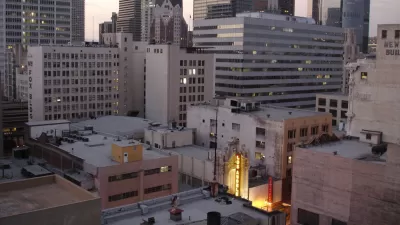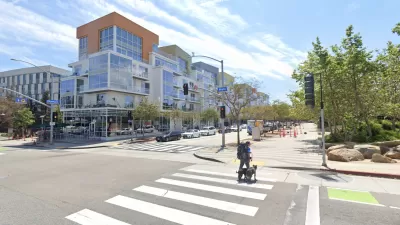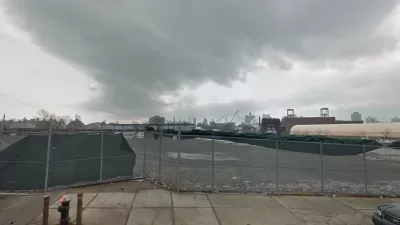A proposed clean tech corridor along the L.A. River east of downtown is another twist in the ongoing battle between competing interests for residential development and the preservation of industrial space.
The article features in-depth Q&A with Central City East Association Executive Director Estela Lopez:
"For the vast majority of the last 25 years, the city has ignored industrial Downtown. In the last year and a half, there has been renewed attention to jobs and retaining jobs in the city of Los Angeles. The way to do that may be to look at the development of this area as an industrial campus for the new industry-clean technology."
"When the Industrial Land Use Initiative was first discussed by the CRA/LA and the Planning Department, it divided this community. It divided the community between the industrial operators and the people who understand the demand for housing throughout Los Angeles. There aren't many communities that want greater density. Here you have a community that sees housing as an instrument for the realization for the new vision for the Arts District, an artists' community that has been a vital part of the area for several decades and wants to remain a vital part of the area."
"The streets here in CCE are narrow and incapable of meeting the goods movement requirements of today's modern industrial economy. The parcelization of the district works against anyone needing to amass land expansive enough-to provide the proper setbacks. That is a question that has not been remedied in 25 years, and I don't see how that could be easily done. The land here is simply not well-suited for reintroduction of massive industrial uses."
Thanks to James Brasuell
FULL STORY: Will The Push to Create Green Manufacturing Jobs Shape the Development of L.A.'s Central City East?

Alabama: Trump Terminates Settlements for Black Communities Harmed By Raw Sewage
Trump deemed the landmark civil rights agreement “illegal DEI and environmental justice policy.”

Study: Maui’s Plan to Convert Vacation Rentals to Long-Term Housing Could Cause Nearly $1 Billion Economic Loss
The plan would reduce visitor accommodation by 25% resulting in 1,900 jobs lost.

Planetizen Federal Action Tracker
A weekly monitor of how Trump’s orders and actions are impacting planners and planning in America.

DC Extends Application Window for Outdoor Dining Permits
District restaurants will have until the end of November to apply, but businesses with permits in rush hour parking lanes must end operations on July 31.

Wind Energy on the Rise Despite Federal Policy Reversal
The Trump administration is revoking federal support for renewable energy, but demand for new projects continues unabated.

Passengers Flock to Caltrain After Electrification
The new electric trains are running faster and more reliably, leading to strong ridership growth on the Bay Area rail system.
Urban Design for Planners 1: Software Tools
This six-course series explores essential urban design concepts using open source software and equips planners with the tools they need to participate fully in the urban design process.
Planning for Universal Design
Learn the tools for implementing Universal Design in planning regulations.
Caltrans
Smith Gee Studio
Institute for Housing and Urban Development Studies (IHS)
City of Grandview
Harvard GSD Executive Education
Toledo-Lucas County Plan Commissions
Salt Lake City
NYU Wagner Graduate School of Public Service





























